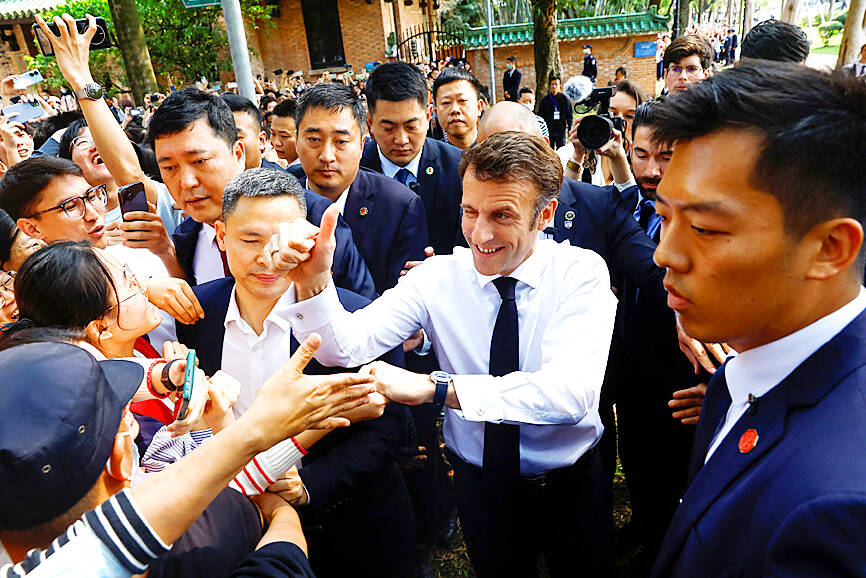French President Emmanuel Macron’s unexpected suggestion that Europe not “follow” US policy on Taiwan is being hailed as a “brilliant decision” this week in China.
Macron sowed confusion across the international community — and left Western allies bristling — after calling for “strategic autonomy” on Taiwan following last week’s trip to China, where he met with Chinese President Xi Jinping (習近平).
The 45-year-old Macron enjoyed a rock star’s reception during his three-day visit, including being mobbed by selfie-chasing students in the southern city of Guangzhou, and local media have covered his subsequent comments widely, focusing on the phrase “strategic autonomy.”

Photo: Reuters
An opinion piece published on Monday by the Chinese Communist Party-run Global Times said the comments were “clearly the result of Macron’s long-term observation and reflection,” and represented a path that was “relatively objective, rational and in line with Europe’s own interests.”
“Some people want to construct a false Europe in public opinion, masking true European voices and interests,” the article added.
Chen Weihua (陳偉華), the Brussels bureau chief for state-run China Daily, wrote on Twitter that “Macron’s words about EU strategic autonomy and resisting a new Cold War and decoupling will also prove to be a brilliant decision.”
Macron’s words on distancing Europe from Washington on the subject of Taiwan prompted elation on social media in China.
“Daring to talk openly about autonomy,” a user of social media site Sina Weibo commented under a news article on Macron. “Europe has progressed.”
While the reputations of most Western leaders in China have suffered in the past few years, Macron enjoys a largely favorable public image — an attitude made evident by the hordes of students in Guangzhou.
His willingness in the recent interview to differentiate French foreign policy from that of the US on the issue of Taiwan helped bolster that fan base.
“Macron’s ideas are very good. Europe’s arrogance and inaction for many years have led to extreme strategic passivity, being pulled along by the US,” one social media user commented.
Such triumphant Chinese perspectives have also been tempered by more sober voices contending that geopolitical realities necessitate that France and Europe remain largely aligned with the US.
Hu Xijin (胡錫進), a prominent political commentator and former editor-in-chief of the state tabloid Global Times, on Monday wrote on Sina Weibo that — despite Macron’s rosy comments — it was “unrealistic” for China to think France would side with them in future confrontations with the US.
Europe and the US “have shared values and are bound together by NATO,” Hu wrote.
“But we can firmly believe that as long as China treats European countries reasonably and fairly while the US forces them to oppose China, conflicts between their strategic interests will rise to the surface,” he added.

Seven people sustained mostly minor injuries in an airplane fire in South Korea, authorities said yesterday, with local media suggesting the blaze might have been caused by a portable battery stored in the overhead bin. The Air Busan plane, an Airbus A321, was set to fly to Hong Kong from Gimhae International Airport in southeastern Busan, but caught fire in the rear section on Tuesday night, the South Korean Ministry of Land, Infrastructure and Transport said. A total of 169 passengers and seven flight attendants and staff were evacuated down inflatable slides, it said. Authorities initially reported three injuries, but revised the number

‘BALD-FACED LIE’: The woman is accused of administering non-prescribed drugs to the one-year-old and filmed the toddler’s distress to solicit donations online A social media influencer accused of filming the torture of her baby to gain money allegedly manufactured symptoms causing the toddler to have brain surgery, a magistrate has heard. The 34-year-old Queensland woman is charged with torturing an infant and posting videos of the little girl online to build a social media following and solicit donations. A decision on her bail application in a Brisbane court was yesterday postponed after the magistrate opted to take more time before making a decision in an effort “not to be overwhelmed” by the nature of allegations “so offensive to right-thinking people.” The Sunshine Coast woman —

BORDER SERVICES: With the US-funded International Rescue Committee telling clinics to shut by tomorrow, Burmese refugees face sudden discharge from Thai hospitals Healthcare centers serving tens of thousands of refugees on the Thai-Myanmar border have been ordered shut after US President Donald Trump froze most foreign aid last week, forcing Thai officials to transport the sickest patients to other facilities. The International Rescue Committee (IRC), which funds the clinics with US support, told the facilities to shut by tomorrow, a local official and two camp committee members said. The IRC did not respond to a request for comment. Trump last week paused development assistance from the US Agency for International Development for 90 days to assess compatibility with his “America First” policy. The freeze has thrown
TESTING BAN: Satellite photos show a facility in the Chinese city of Mianyang that could aid nuclear weapons design and power generation, a US researcher said China appears to be building a large laser-ignited fusion research center in the southwestern city of Mianyang, experts at two analytical organizations said, a development that could aid nuclear weapons design and work exploring power generation. Satellite photos show four outlying “arms” that would house laser bays, and a central experiment bay that would hold a target chamber containing hydrogen isotopes the powerful lasers would fuse together, producing energy, said Decker Eveleth, a researcher at US-based independent research organization CNA Corp. It is a similar layout to the US$3.5 billion US National Ignition Facility (NIF) in northern California, which in 2022 generated